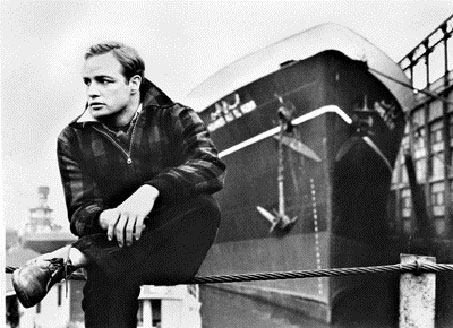On the Waterfront
    A former prizefighter (Marlon Brando) is caught up in a corrupt union
headed by a mobster (Lee J. Cobb), but starts to question his beliefs
when he falls for the sister (Eva Marie Saint) of a man who was murdered
for informing.
 Kazan's boldly emphatic style was never put to better use than in
this gritty social drama, which captured the Oscars for picture,
director and actor. The atmosphere of menace which had hitherto been
confined to the crime picture (later known as "film noir") was here
skillfully expanded to a wider realm, and combined with a visual style
that emphasizes the desolation of the urban landscape and the cramped
inner life of the working class. It was something new in American
pictures, the product of a decade-long shift away from studio to
location shooting, and from the old "seamless" technique to a
rough-edged style influenced by the school of method acting. If in some
ways it seems old hat today, part of that is due to its immense
influence on later productions. Kazan's boldly emphatic style was never put to better use than in
this gritty social drama, which captured the Oscars for picture,
director and actor. The atmosphere of menace which had hitherto been
confined to the crime picture (later known as "film noir") was here
skillfully expanded to a wider realm, and combined with a visual style
that emphasizes the desolation of the urban landscape and the cramped
inner life of the working class. It was something new in American
pictures, the product of a decade-long shift away from studio to
location shooting, and from the old "seamless" technique to a
rough-edged style influenced by the school of method acting. If in some
ways it seems old hat today, part of that is due to its immense
influence on later productions.
For all its starkness and sense of alienation, On the Waterfront
still suffers from a simplistic story and script, and an overwrought
dramatic emphasis. It's safe to say that the film probably woudn't have
worked at all but for the great lead performance of Brando. His Terry
Malloy - brutal, ignorant, mutely suffering, constantly wavering between
tenderness and aggression - is a fully realized dramatic creation that
demonstrates just why he was the most admired actor of his time. Watch
him, not only in the great scene with Rod Steiger (as his brother) in
the taxicab, but also in his scene at the bar with Saint, or on the
rooftop with the young toughs, or in just about any of his scenes - and
marvel at the way his inflections, hesitations, body movements,
everything about him, displays an inner conviction and power that makes
his character exist in the flesh. He carries the film on his shoulders
and makes it work.
Most of the other actors do fine, particularly Cobb, who is his usual
larger-than-life self. The one glaring exception is Karl Malden -
unconvincing in the admittedly misconceived role of a crusading priest.
Leonard Bernstein's music is great on its own terms, but too
overpowering at times as a film score. And the ending - well, it's
dramatic, alright, but if you think anything like that would really
happen outside of a movie, you haven't seen too much of the world.
It's hard to watch the film without relating it to Kazan's own
controversial decision, two years before, to turn on his friends and
"name names" to HUAC during the witch hunts. There is something awfully
defensive and self-serving about the aspect of the film which treats of
informing as a moral act. Seen without reference to the director's
history, however, it doesn't create the impression of a reactionary
tract, but rather an impassioned drama about the moral awakening of an
unlikely hero. The film's crude theatricality has not worn well over
time, but the visual style, and especially the central performance by
Brando, insures that it has a place in the pantheon of classic films.
|

